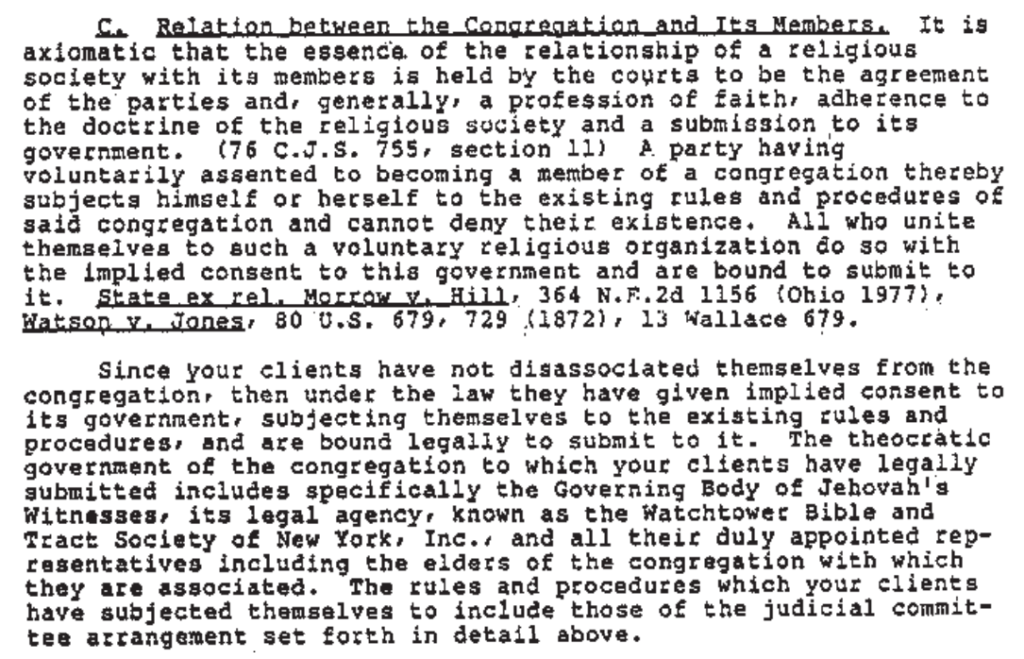
Baptism — validated by whom?
Historical writer Johnson observed that in the post-apostolic period it became the case that, along with the Bible, “the sacraments . . . lost their meaning if used outside the church.” A primary “sacrament” was that of baptism.
Initially among Bible Students in Russell’s day, no issue was made as to one’s having been baptized while affiliated with one of the various Christian denominations. The only question was whether one understood the meaning of baptism and whether this was by immersion.1 That remained the case for over seven decades. As late as the July 1, 1955, The Watchtower (page 412) it was stated that rebaptism was necessary only if the “previous baptism was therefore not in symbol of a dedication” or if it was not by immersion.
One year later, in the July 1, 1956, Watchtower the position was reversed. It said (page 406):
BAPTIZED A SECOND TIME
Often the question is asked whether one baptized previously in a ceremony performed by some other religious group should again be baptized when coming to an accurate knowledge of the truth and making a dedication to Jehovah. Because of what has been already said, now there is compelling reason for also saying, Yes, one must be baptized again. Obviously, by any of such religious systems one was never in reality baptized “in the name of the Father and of the Son and of the holy spirit,” because had he been so baptized he would have appreciated the authority and office of such true Higher Powers. And if previously dedicated to Jehovah, the individual would have separated himself from such God-dishonoring Babylonish systems even before letting them baptize him. So the act of being baptized is not the important thing, but, rather, that which the act symbolizes is the element of importance.
This was, however, followed up by a “Question from Readers” about six months later that qualified the terms for rejecting as invalid any baptism “outside the organization” — even though by immersion. Now it was said that the cutoff date for possible validity of such baptism was the year 1918. Why? Because “in A.D. 1918 . . . Jehovah God accompanied by his Messenger of the Covenant came to the temple and cast off Christendom.” If the person had been immersed in symbol of dedication to God and Christ before that date, and had also left his or her previous denomination and affiliated with the Watch Tower organization before 1918, it was left up to the person’s conscience to decide if rebaptism was in order or not. For all others the firm position was:
Hence now when the call to come out of Babylon is being clearly sounded out, if anyone has heard of this call and yet remains in a religious part of antitypical Babylon and gets immersed in such a religious part, his immersion would not count. His decision could not have been a dedication to do God’s will, because, to quote paragraph 14, “the individual would have separated himself from such God-dishonoring Babylonish systems even before letting them baptize him.”2
He must be rebaptized. The question was positively settled because the words of “paragraph 14” of the Watchtower settled it. Scriptural evidence was apparently not required. In the post-apostolic period, baptism “lost its meaning if performed outside the Church,” that is, outside the domain of religious authority. The same position was now taken by the Watch Tower organization of any baptism not performed within its domain.
Back in 1955, the Watchtower had said:
A Christian . . . cannot be baptized in the name of the one actually doing the immersing or in the name of any man, nor in the name of any organization, but in the name of the Father, the Son and the holy spirit. This shows, among other things, that Christianity is not a denominational affair… 3
In talks preceding a baptismal ceremony, it was common for the speaker to remind the candidates that “you are not symbolizing your dedication to a work, or dedication to an organization, but your dedication to a person—Jehovah God.”4 Somewhat similarly, the October 1, 1966, Watchtower (page 603) stated:
We do not dedicate ourselves to a religion, nor to a man, nor to an organization. No, we dedicate ourselves to the Supreme Sovereign of the Universe, our Creator, Jehovah God himself. This makes dedication a very personal relationship between us and Jehovah…
In 1942, the two questions put to candidates were these:
(1) Do you believe in Jehovah God the Father, that “salvation belongeth unto Jehovah”, and that Christ Jesus is his Son in whose blood your sins are washed away and by whom salvation comes to you from God?
(2) Have you therefore confessed yours sins to God and asked for cleansing by Christ Jesus, and therefore turned away from sin and the world, and consecrated yourself without reservation to God to do his will?5
These questions were essentially close in content to the expressions of Peter and others of the apostolic period when calling on persons to “Repent and be baptized, every one of you, in the name of Jesus the Messiah for the forgiveness of your sins; and you will receive the gift of the Holy Spirit.”6
In 1956 and (with very minor variation) for many years thereafter the questions presented at Witness baptismal services were these:
(1) Have you recognized yourself before Jehovah God as a sinner who needs salvation, and have you acknowledged to him that this salvation proceeds from him the Father through his Son Jesus Christ?
(2) On the basis of this faith in God and in his provision for salvation, have you dedicated yourself unreservedly to God to do his will henceforth as he reveals it to you through Jesus Christ and through the Bible under the enlightenment of the holy spirit?7
With absolutely no Biblical discussion for making any major change in these basic questions which individuals must answer affirmatively to qualify for baptism, the June 1, 1985, Watchtower now listed these as the questions to which all candidates were to respond:
The first question is:
On the basis of the sacrifice of Jesus Christ, have you repented of your sins and dedicated yourself to Jehovah to do his will?
The second is:
Do you understand that your dedication and baptism identify you as one of Jehovah’s Witnesses in association with God’s spirit-directed organization?
Having answered yes to these questions, candidates are in a right heart condition to undergo Christian baptism.
The April 15, 1987, Watchtower (page 12) gives this unusual explanation of the reason for this change saying: “Recently the two questions addressed to baptismal candidates were simplified so that candidates could answer with full comprehension of what is involved in coming into intimate relationship with God and his earthly organization.” This supposed “simplification” did only one thing: it required of each candidate a declaration of submission and obligation to an earthly organization. If we read the Christian Scriptures we see that the crucial factor validating baptism was in every case that those taking that step “believe on the Lord Jesus” as God’s Messiah and their Redeemer, able to save them.8 They were “baptized into Christ Jesus.”9 This was “simple” enough that persons could, and did, comprehend it in one day, in a few hours. There is nothing apostolic about the Watch Tower organization’s “loaded” wording of the matter, for the apostles never brought into the picture the concept of an “earthly organization,” which, as has been clearly demonstrated, refers to nothing more or less than a human authority structure.
Christ had told his disciples to baptize persons “in the name of the Father and the Son and the Holy Spirit.”10 The Watch Tower’s second baptismal question effectively replaces God’s holy Spirit with “the spirit-directed organization.” While the Spirit receives token mention, once again we are faced with the situation where the organization appropriates a divinely assigned role for itself. It clearly conveys the idea that God’s holy Spirit will not operate on the person being baptized except in connection with the Watch Tower organization. It does not emphasize the way in which the individual being baptized will henceforth be guided by God’s Spirit but instead stresses the “spirit-directed organization.” It seems incredible that The Watchtower can then refer to this as a “simplification” of previous questions. It speaks of an “intimate relationship with God” but makes this meaningless for it shoves the earthly organization into the matter, making it, not an intimate relationship with God, but an intimate relationship “with God and his earthly organization.” Whereas Jesus spoke only of “the Father, the Son and the Holy Spirit,” the organization presumes to place itself in this sacred picture as an indispensable party to it. This is tantamount to a servant telling people that they can have contacts and relationship with a master only provided the servant is always there too, acting as intermediary, spokesman, manager, decisionrenderer. Such an attitude could only be classified as arrogant.
For 19 centuries persons had been baptized without their baptism being prefaced by any such wording. For over one hundred years persons among Watch Tower associates had been baptized without such wording. Did they not properly understand what their baptism meant? Why, after over 100 years, was this “simplification” now needed in order for persons to have “full comprehension” of what their baptism signified?
I believe that the 1985 alteration represents a concern to have persons acknowledge formal ties to the organization, a commitment to it as a religious authority over them and therefore an implied acceptance of its government over them and its right to direct the formation of ecclesiastical courts to “try” those viewed as in violation of its rules and policies.
In recent years, a fair number of persons have simply withdrawn from association with the Witness organization without making any formal notification of disassociation. Even though continuing to live moral lives, if they subsequently do or say something that manifests that they are not in full accord with each and all of the organization’s teachings and policies, they are frequently approached by elders, questioned and often summoned to a “judicial hearing.” Some have stated that they saw no reason to attend such hearing, that they did not view themselves as subject to the organization’s ecclesiastical authority. Some have even had an attorney send a letter to the elder body stating their position and requesting that they not be subjected to further investigation, interrogation or summons. In virtually all such cases, the Watch Tower Society’s legal department has mailed to the person (or to the attorney, if one was involved) a bulky package in the form of a legal brief, presenting much evidence of the organization’s success in the courts in related cases and citing numerous legal cases in support of their right to act as a religious “government” and “ecclesiastical court” toward persons baptized by the Witnesses. In essence, the material states that the person or persons involved have only two alternatives, either attend the “judicial hearing” or formally disassociate themselves. As an example, the material cites one U. S. Supreme Court decision which, among other things, says:
The right to organize voluntary religious associations to assist in the expression and dissemination of any religious doctrine, and to create tribunals for the decision of controverted questions of faith within the association, and for the ecclesiastical government of all individual members, congregations, and officers within the general association, is unquestioned. All who unite themselves to such a body do so with an implied consent to this government, and are bound to submit to it.
The “right” referred to is the legal right of an “ecclesiastical government” to act in the manner described. Thus, the brief sent out by the Watch Tower Society’s attorney stresses the “legal” factor when summing up matters in this way:

In objecting to being investigated and “tried” by elders, some who have withdrawn have pointed out that in the pre-1985 period when they were baptized they ‘dedicated themselves to God and not to an organization.’ The altered questions now used plainly tell the baptismal candidate that he is committing himself to a “dedication and baptism” that ‘identifies him as one of Jehovah’s Witnesses in association with God’s spirit-directed organization.’ This assures that he has indeed forfeited any “legal” right to say he is not subject to the organization’s government and ecclesiastical courts. At least for the organization’s legal department, this does, indeed, “simplify” matters. I find it a sad evidence of the concern for authority that any organization would utilize the sacred, very personal step of baptism as occasion for asserting its authority in the baptized one’s life.
NOTES
1 – I recall my uncle, Fred Franz, when already the Watch Tower’s vice president, remarking to me that if his baptism in the Presbyterian Church had been by immersion (rather than sprinkling) he would have considered it still valid.
2 – The Watchtower, December 15, 1956, page 763.
3 – The Watchtower, July 1, 1955, page 411.
4 – As I recall, this point was even included in outlines supplied by the Watch Tower for those giving baptismal talks.
5 – The Watchtower, October 1, 1942, page 302.
6 – Acts 2:38, NEB; 1 Peter 3:21, 22.
7 – The Watchtower, July 1, 1956, page 407.
8 – Acts 16:31-33; compare also Acts 2:36; 8:5, 12, 27-38; 9:1-20; 10:34-48; 11:16, 17; 18:8; 19:3-5.
9 – Romans 6:3; Galatians 3:27.
10 – Matthew 28:19, NEB.

